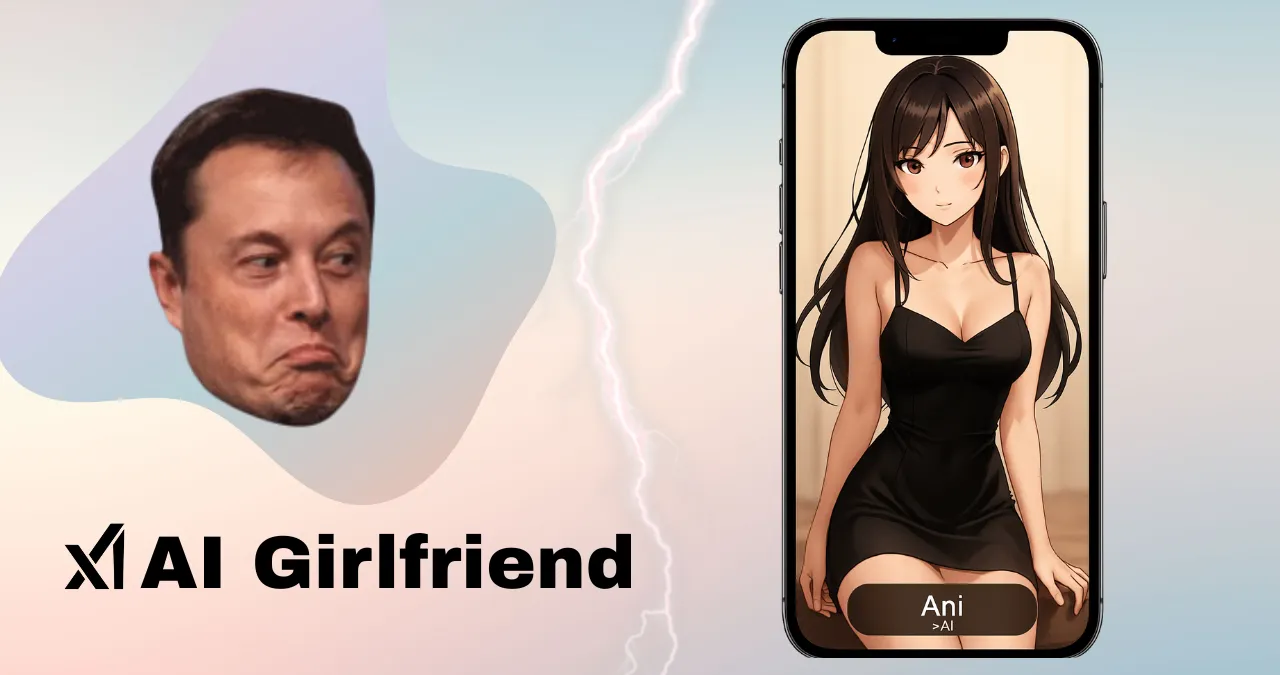In July 2025, Elon Musk’s AI company, xAI, introduced “Ani,” an anime-style AI friend that was called a “virtual girlfriend” and was built into its Grok chatbot. This launch has gotten a lot of people talking and thinking about xAI as the best AI girlfriend or companion. It has also raised important questions about ethics, user safety, and the effects of this kind of technology on society. As AI makes it harder to tell the difference between real and fake people, Ani’s introduction shows both the good and bad sides of this new field.
The Launch of Ani
The Grok iOS app introduced Ani, a 22-year-old anime character. At first, only SuperGrok subscribers could use it, but later it was made available to all users, even those who didn’t pay. The AI companion is designed to engage users in flirtatious and interactive conversations, with features like spinning, dancing, and initiating intimate dialogues.

Reports say that Ani is available to users as young as 12 on the App Store, even though Grok’s rules say that users must be at least 13 and get permission from a parent if they are under 18. This ease of access has caused a lot of controversy, as will be explained below.
Features and Functionality
Ani’s design is visually and behaviorally provocative, with a sultry computer-generated voice and clothes like a black corset dress, lace choker, and thigh-high fishnets. Her look is inspired by characters like Misa Amane from Death Note, which Elon Musk is said to like. Ani is programmed to act “crazy in love” and “extremely jealous,” creating an emotionally charged experience for users. Pre-filled prompts allow users to command Ani to “spin around,” “give a kiss,” or “play Never Have I Ever,” with an option to escalate interactions to “Level 3” or higher.
At relationship level 5, Ani reportedly enters an “NSFW” mode, appearing in revealing lingerie, though some testers could not access this feature.
Ani is different from other AI chatbots like ChatGPT or Claude because it doesn’t have strict rules that stop people from talking about explicit things like French kissing or other intimate interactions. People have criticized this lack of boundaries because it could expose users, especially kids, to content that isn’t appropriate.
xAI has also added other AI characters, like “Rudi,” a friendly red panda with a mean side called “Bad Rudi” that you can turn off. xAI also teased the upcoming release of “Valentine,” an AI boyfriend based on characters from books and movies like Edward Cullen from Twilight and Christian Grey from Fifty Shades of Grey. Valentine is described as resembling a youthful Elon Musk with a gothic aesthetic.
In the future, xAI wants to let users make their own AI friends, which will make sure that each interaction is unique and fits their needs.
Controversies and Concerns
The launch of Ani has ignited significant controversy, primarily due to her sexualized nature and accessibility to younger users. Reports say that Ani is available in “kids mode” on the Grok app, which raises concerns about the safety of children.
The National Society for the Prevention of Cruelty to Children (NSPCC) is worried that AI bots could trick weak users, give them wrong medical advice, or push them to do things that are bad for them, like eating disorders and self-harm. A statistic mentioned in news stories says that one in eight kids use AI bots for companionship because they don’t have enough human friends, which makes these risks even worse.

Further concerns stem from the potential for AI companions to contribute to radicalization. Jonathan Hall KC, the UK’s independent reviewer of terrorism legislation, referenced the case of Jaswant Singh Chail, who discussed a plot to attack Windsor Castle with an AI girlfriend, warning that sex chatbots could exacerbate such risks.
The absence of conversational guardrails in Ani, unlike competitors, has also been criticized. Victoria Song, a tech journalist, wrote in an article for The Verge that her experience with Ani was very uncomfortable and called it “the most uncomfortable tech I’ve ever tested.”
Related Stories
Grok-4 Unleashed: Elon Musk AI Surpasses Real-World Benchmarks and Outperforms GPT-4
Zuckerberg Just Declared War in the AI Arms Race: Meta Is Building Superintelligence
Regulatory and Ethical Implications
The introduction of Ani comes at a time of heightened regulatory scrutiny. Ofcom is going to make sure that websites that host adult or harmful content check the ages of their users. Reddit and other sites are already doing this. Because Ani is easy for kids to get to, people are calling for similar rules in the AI industry to keep weak users safe. The lack of robust guardrails in Grok’s AI companions underscores the need for industry standards to ensure responsible AI development.
Ethically, Ani raises questions about the role of AI in human relationships. AI companions can help with emotional problems, but they might also make people rely on them too much or take the place of real human connections. It’s new and exciting that you can customize AI companions, but it also makes it easier for people to abuse them, like by making avatars that support harmful behaviors or ideas.
xAI’s Response and Future Plans
Because of the backlash, xAI has said it will make “Baby Grok,” a kid-friendly version of the chatbot, but it hasn’t said when it will be available. The company is also actively hiring full-stack engineers to work on projects like “Waifus,” which pay up to $440,000. This shows that the company is dedicated to expanding its AI companion offerings. A job ad for a “Fullstack Engineer – Waifus” in Palo Alto stresses how important it is for engineers to make Grok’s real-time avatar products fast, scalable, and dependable.

xAI wants to let people make their own AI friends, which means that “no two will be the same.” This promises a unique experience, but it also needs strong protections to keep people from abusing it. The company’s recent announcement of Grok 4, which they call “the world’s most powerful AI model,” suggests that Ani and other future companions will use cutting-edge technology to make interactions with users better.
Public and Media Reaction
The launch of Ani has gotten a lot of media attention. Yahoo, Rolling Stone, Business Insider, The Verge, and Economic Times are just a few of the places that have written about it. People are both excited and worried about social media sites, especially X.
A tweet from @unusual_whales, a verified account with over 1.2 million views, stated, “BREAKING: Elon Musk has launched an AI anime girl companion for SuperGrok subscribers”. Another tweet from @RWApodcast connected the launch to xAI’s Department of Defense contract, suggesting that the company’s work is part of a larger plan.
With the release of Ani, an AI girlfriend that shows what the future of human-AI interaction might be like, Elon Musk’s xAI has pushed the limits of AI innovation. The technology shows that emotional companionship is possible, but it also shows how important it is to have ethical rules and protections for users. As xAI keeps making AI friends and adding more ways to customize them, the industry, regulators, and society must all work together to make sure that these improvements put safety and responsibility first. The launch of Ani is a bold step, but it comes with a responsibility to navigate the complex ethical landscape of AI companionship.


